Back in May 2020, when Beijing was recovering from the first pandemic wave, Claire Courtney set about putting on the first Jing and Tonic after witnessing the devastating effects COVID-19 had on live houses and bars. It was a variety show filled with comedians, magicians, music acts and a whole lot more. The 30-year-old was working as an English teacher in China’s capital at the time and had only just started to earn her stripes in the city’s music scene after testing the water at a few open mics.
While Courtney’s performance talents would come to fruition a bit later, the focus during this period was getting people out for a good time. It wasn’t a diplomatic venture or an exercise in good foreigner PR, but just an outlandish and ambitious Scotswoman wanting to use her contacts to create something memorable after a difficult time.
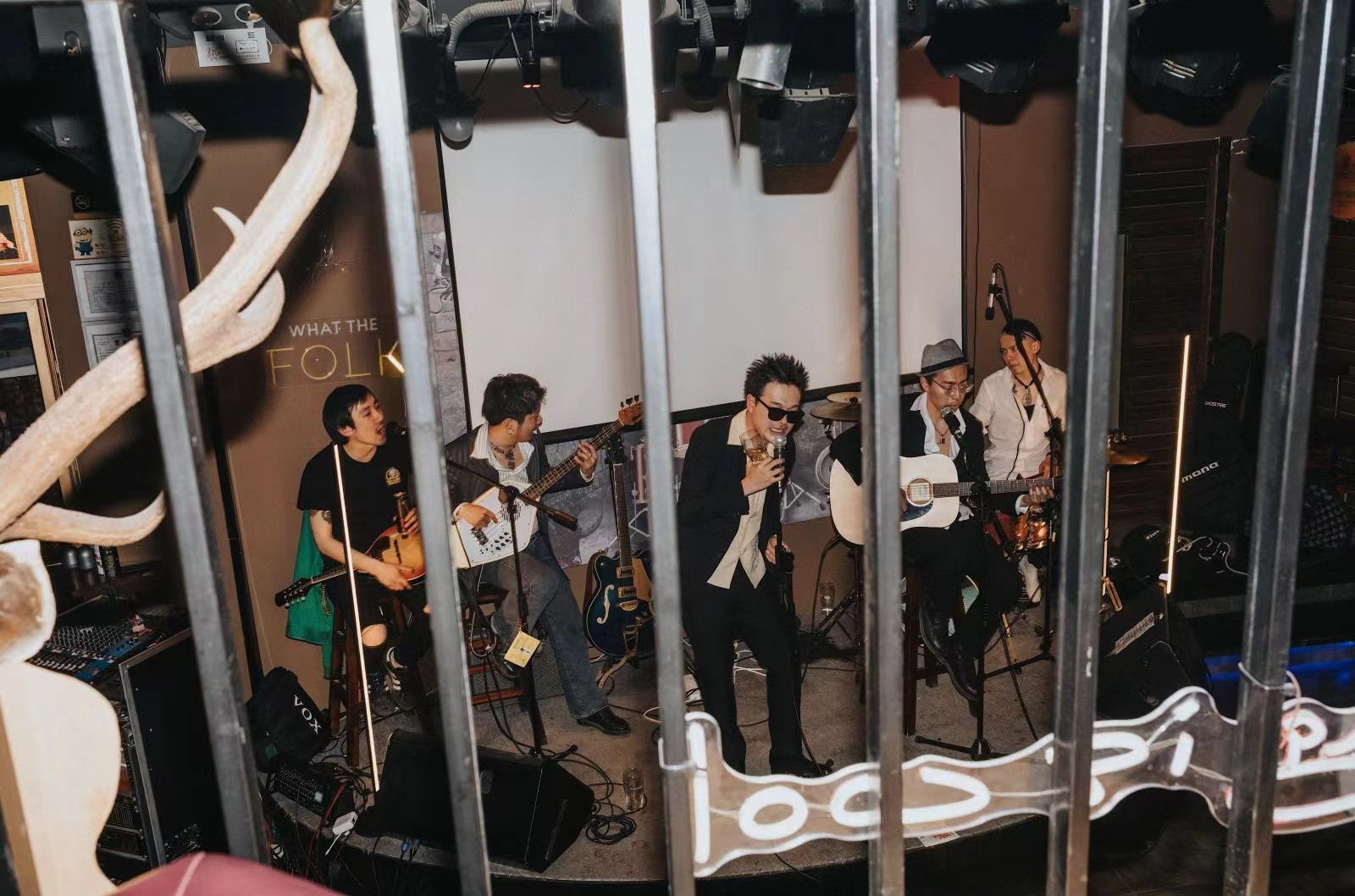
Beijing punk rockers Gumbleed providing some acoustic attitude. Image via @achiiii_
“I think boredom was setting in and we needed something, we needed that outlet because a lot of performers, creative people, musicians, artists and comedians all needed somewhere to perform,” says Courtney.
“Beijing is such a hotbed for this kind of stuff. Before COVID-19 it was absolutely jumping, especially in the six years I was there. It was an incredible scene for music, entertainment and live shows and suddenly it was gone.”
Jing and Tonic proved to be a success with its otherworldly and unique acts adding a new string to the bow of the city’s nightlife. It ran for 13 editions across as many venues before it ended with the founder’s departure from China in September 2021.
Seven months before her exit, and with the increasing popularity of Jing and Tonic, Courtney decided to add to her portfolio of events with What the Folk, a monthly night consisting of unplugged music from a wholehost of different genres. Solo acts and bands, upcoming and established, were to make up this new showcase which would hit different bars. Not only did it pose a bigger challenge on an organizational front, but this kind of regular night had also never existed in Beijing and for it to be pioneered by a foreigner was a steep mountain to climb.
“I think there was a huge element of the blind leading the blind, but no one knew I was blind,” she says, speaking metaphorically. “It was to be for people who have put a lot of work in on the open mic scene and should have a bigger platform. How nice is it that [performers] get a gig of their own? Sharing a stage meant we could do it on a much larger scale. I have no idea why it didn’t exist before.”
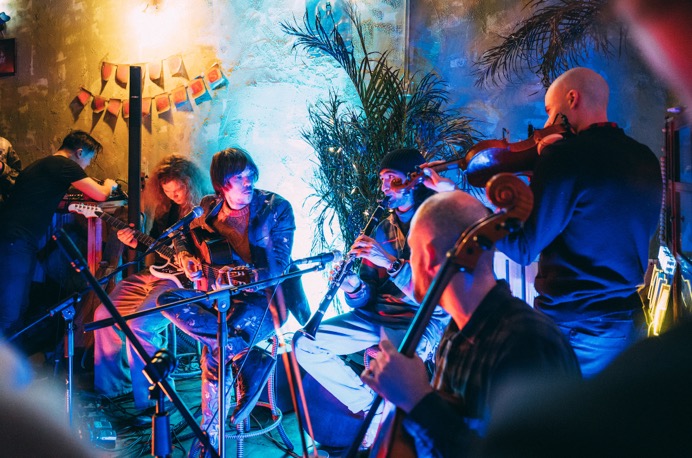
Phuture Vulture & the Absolute performing at the Christmas edition. Image via @achiiii_
Acoustic music has a unique appeal. Whether it’s folk tugging at the heartstrings, an uplifting jig prompting a unison of stomps or a stripped-down version of your favorite song which makes you believe you can sing; it’s a special environment. To help create that desired vibe, Courtney put together a team.
“I was fortunate to have a very talented group of friends,” recounts Courtney. “It wasn’t like, I want to do this, and I only want to do this with my friends, there was a lot of networking involved. My Chinese isn’t all that great and my knowledge of the Chinese side [of the industry] wasn’t either, so that was challenging. I guess I had to bring in the right people to be able to do that.”
Those right people were Brit Jake Nimer, Ireland’s Orlaith Fagan, Beijing native Fred Shi and his countryman Jun Yan from Lanzhou. All four helped seek out venues, acts and equipment. Regular inquiries ranged from the availablility of drum kits to drink deals.
With Beijing’s current COVID-19 problems, our chat with them takes place roadside over some 7-11 beers. Three of the four had experience in performing and are regularly seen on stages across China but drifting into a music scene clique was something they desperately wanted to avoid, as Fagan explains.
“I’m not a musician. I don’t want it to be like ‘we are all in bands, we all hang out at this event.’ We want to bring people in from all over. Of course, we get musicians who are our friends, but we try to get bands and crowds from different walks of life and make it an inclusive environment for everybody.”
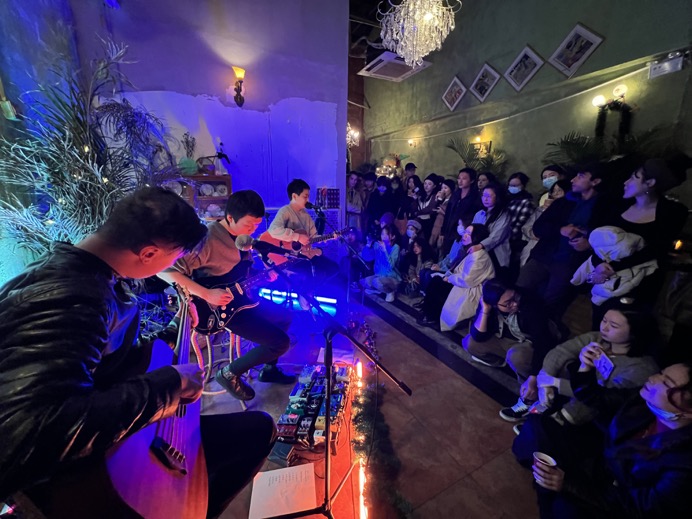
Beijing post-rockers Silent Speech toning down their usual energetic sound. Image via @achiiii_
The inclusivity was there to be seen on February 20 last year. The first What the Folk was held at Mogu Space in Beijing. It was a tight squeeze in a room that somewhat resembled a library. There was a fridge full of beer and only one bar person making mixed drinks for those who had the patience to wait. Old-school is an understatement.
A passionate singer-songwriter, three melodic young women, a tight duo bursting with chemistry and a string band (whose singer seemed to be doing his best Vincent Price impression) were the first lineup. Diverse, atmospheric and emotive, they set the tone for what crowds would come to expect.
“There are gigs that you can go to where you don’t get to talk to the bands. At our show, you literally sit three meters away from the singers and they are most likely going to come off the stage and hang out for a bit and you get to ask them questions about their music and the stories behind their songs,” says Yan proudly, whose main contribution is promotion on Chinese social media platforms.
“It’s the type of event where people don’t hold up their phones. They pay attention to the music and the connection between the crowd. That was the major reason I wanted to contribute to the project because you can’t say that for most other gigs.”
Audience rapport is at the forefront of their unwritten mission statement. Since that first show, What the Folk has blended the musical camaraderie of an open mic with the mystique and talent of showmanship. All while performers relish the chance to be part of such an intimate surrounding.
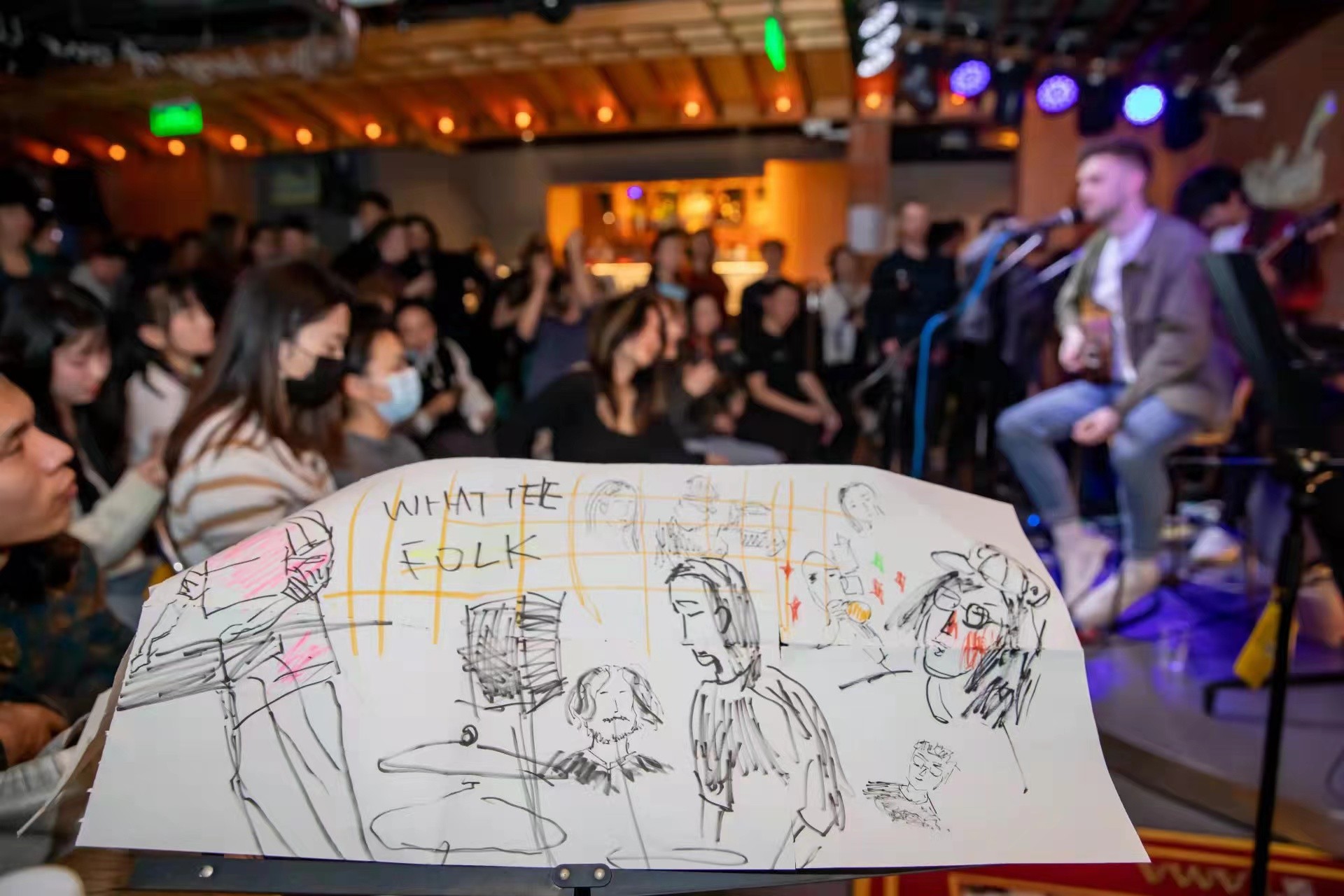
Indie outfit Axis Neptune at an edition where the audience were invited to draw the performances. Image via Simone B
Beijing post-rockers Silent Speech used it as an opportunity to strip back their usual energetic and complex sound to deliver something softer and more thoughtful. Punk outfit Gum Bleed also toned down their usual approach to give the audience some acoustic attitude. The event’s host Nimer claims, after a short sip of cold Tsingtao, getting all kinds of bands and performers to adapt their sound is what will always make WTF special.
“We’ve had punk bands playing alongside folk bands who would never usually be at the same venue together. In Beijing, so many of our favorite places have closed in the last couple of years and these guys, who would usually be in separate corners of the city, get together for one event and end up drinking together, having fun and getting the crowd going. That’s what it’s all about. It’s about getting everyone together and keeping the music alive.”
Chinese folk can conjure images of the past and keeping the music going is one way China preserves its five thousand-year history. In every city, there are bars that reserve a special place for anyone wanting to play. All it takes is a person with an acoustic guitar and a knowledge of these historic tunes. It’s a scene that is familiar to most in the country and with 56 ethnic groups, it is fair to say the genre has gone off on many different tangents. What the Folk is not trying to be a platform for the history of Chinese music, but its stage and setting allow performers to tell their stories.
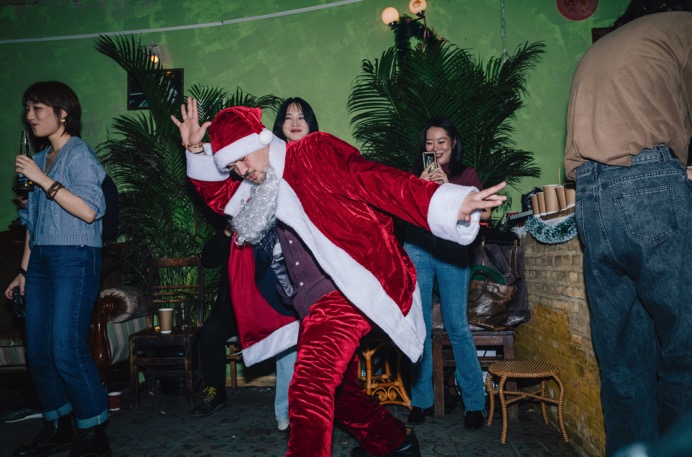
Host Nimer in his Santa Outfit. Image via @achiiii_
Perhaps the most profound act for many came at the Christmas edition in December 2021. Pi bar in Beijing’s popular Sanlitun district was decked out in decorations, Fagan was selling homemade mulled wine by the door and host Nimer had donned a Santa outfit for the evening. It was a small effort to mark a special time of year for many in the audience. While the acts strummed and plucked their way to applause, it was the last band of the night, Yue Huang, that left a lasting impression. These shows are always diverse, but the heartwarming sounds of their folk renditions unlocked contrasting feelings. As the Xinjiang native singer serenaded everyone with her province’s trademark style, the sense of missing home was met with gratitude for this community. Their nostalgic sound wasn’t just appreciated by locals, it resonated with anyone open to different cultural experiences. That evening, the West’s favorite holiday was given a soundtrack from the East of antiquity and wherever home was for those watching, it felt a bit closer for a little while.
“In most of these places, the bar owners are enthusiastic about live music and bringing what we have as a community over to their place,” remarks Shi, shifting forwards to the edge of a portable chair he brought from home. “Once they have understood the concept, they are pretty much always on board. It’s not a jam, it’s not an open mic and it’s not a hotel function. Before, it was only Courtney, and she ran it quite successfully, but it was always in the back of our head to keep What the Folk going.”
An edition is now underway in South Africa, which was founded by the event’s first official photographer, Trev Sibanda after he also left China.
"What the Folk in South Africa went well, it was easy to adapt," Sibanda tells That's. "There were musicians who just wanted to make music and finding a space was relatively easy. In China, I ran a business, I helped other people run projects, I had my own projects and I still had time to do What the Folk. That’s the power of China, it teaches you how to do a million things. I wanted to show South Africa that it doesn’t matter if you have a 9 to 5 job, you can still bring your friends together and play music."
The last Jing and Tonic was held on September 17, 2021, with its loyal patrons fully aware this quirky and often borderline offensive fixture was coming to an end. However, there was a different notion in the air when it came to WTF with performers and music goers yearning for a continuation. By the time Courtney left China, she had cemented her status as somewhat of a laowai cult hero. Performing regularly with three bands and hosting a couple of successful events was more than enough to be a familiar face around town.
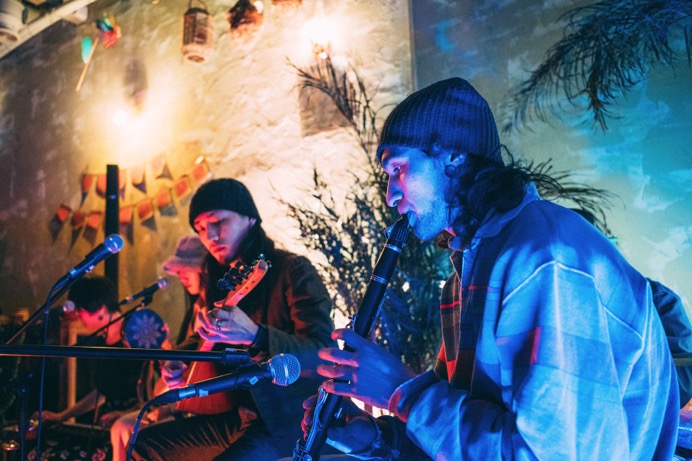
World music band Yue Huang displaying a diverse performance. Image via @achiiii_
“I don’t think I could have handed it over to a better group of people” smiles Courtney. “I like that they are running it as a group, they all have their own responsibilities and I feel so much pride because I’ve left it in the hands of my best friends. That is all I could have asked for. I feel like a weird mum on the sidelines, I’m cheering them on, but I’m not involved. I don’t know what it was about the first gig, but everyone came out saying the same thing. We just felt we were at a proper gig, I don’t how to explain it. I felt some sort of childhood nostalgia. People just walked into it with their arms open. That’s pretty special.”
What the Folk is not a charity, and its organizers are not volunteers with the bands paid competitively. It has become a brand and ultimately, these five people make up just a small part of the picture that continues to be put together by bands, performers, audiences, bars and social media users.
Courtney hasn’t ruled out trying to put it together in Scotland in the future, while her four friends in Beijing have no plans to stop what she started. Like a gang of kids outside the school gates, they possess naive confidence that anything can be conquered if they remain united. Courtney, on the other hand, knows bringing people together through music is nothing new, but the pride she feels in what was created will never get old.
[Cover image via @achiiii]
This is a place for show life about china, If these articles help you life better in china, Welcome to share this website to your friends, Or you can post questions about china life in FAQ, We will help you to find the right answer.

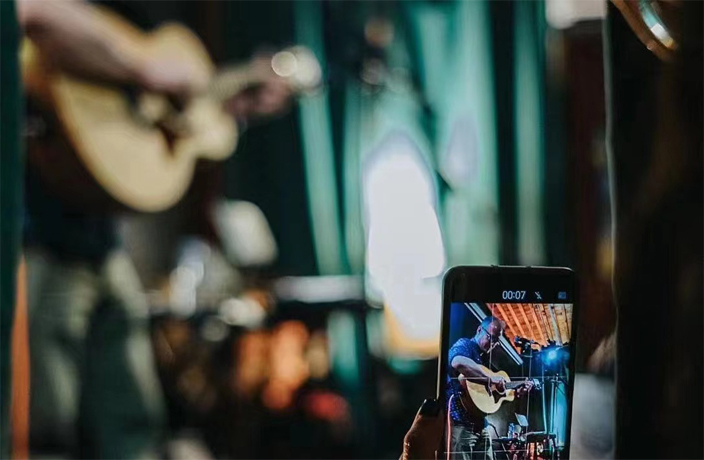



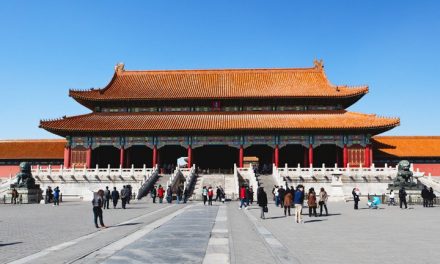
Recent Comments